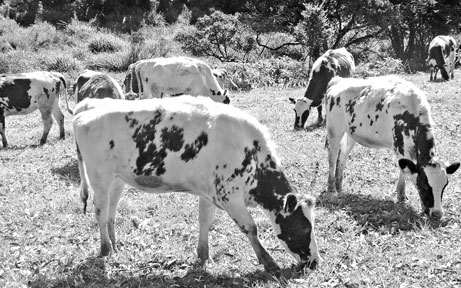Milk, nutrition and need for import substitution
by Sunil KARUNANAYAKE
Milk is a compulsory need for infants as well as growing adults due
to its high nutrient value. Many decades ago, the then Minister of
Education charismatic and controversial, Dr W Dahanayake initiated a
mid-day meal program for schoolchildren comprising a glass of milk and a
bun, perhaps for this reason, Dr Dahanayake was popularly named as
'banis mama'.
 In the mid to late sixties, the Milk Board, an entity of the
Government popularised milk drinking by opening milk booths in schools
and places such as bus terminals. This was a highly successful venture
with milk of many flavours and popsicles being made available to
schoolchildren and the public. With the economic liberalisation in 1977,
the Milk Board too was privatised in keeping with the then government's
policy. In the mid to late sixties, the Milk Board, an entity of the
Government popularised milk drinking by opening milk booths in schools
and places such as bus terminals. This was a highly successful venture
with milk of many flavours and popsicles being made available to
schoolchildren and the public. With the economic liberalisation in 1977,
the Milk Board too was privatised in keeping with the then government's
policy.
The frequent escalation of the price of imported milk powder caused
much heartburn due to the unbearable costs. Given the current flexible
exchange rate regime, it further adds to the complexity. Such milk is
more often consumed by infants and children.
Prior to the 1977 liberalisation of the economy, the limited dairy
industry was more in the hands of the state apart from small farms
operated by small-scale operators.
However, state farms and small scale dairy farmers virtually catered
to the entire village with the aid of a push cycle. The milkman on a
bicycle was a regular sight not only in villages but also in some
cities. In urban residential areas such as Nawala and Narahenpita, a
number of farms operated, with vast grasslands around to feed cattle.
However, with rapid development taking place at that time, most of these
lands became preferred sites for house building. This phase was followed
by the emergence of multinationals investing on a large scale in the
dairy industry.
The annual cost of importing milk powder is estimated at Rs 251
million that is 1.85 percent of the country's import bill.
Multi-national milk food companies gradually increased their control in
local dairy production, which also helped the dairy farming business to
some extent as they purchased liquid milk from local producers and also
compensated them well financially. At times, local producers who could
not supply their produce to multinationals, even threw away their
produce through sheer frustration. Apart from the leading global brand
owners, some importers began importing milk powder with limited
regulatory control, perhaps these practices continue to date also at a
cost to the State.
Sri Lanka is a high import-dependent country. On account of the
continuing global financial crisis, most exports fetch lower prices and
foreign exchange limitations. The Government is now taking steps to
reverse the prevalent trend by promoting fresh milk and curtailing
consumption of imported powdered milk.
In recent times, the National Livestock Development Board (NLDB)
booths were set up at various locations in and around the city that
became popular among the public. However, this process failed to reach
great heights owing to limitation of sales and marketing skills.
The Ministry of Livestock and Rural Community Development (LRCD) is
now working on a plan to reach self-sufficiency in milk by end 2015, a
challenging but rewarding task. It's heartening to note the initiatives
of the Ministry of LRCD by strengthening the private sector social
strategy to empower farmers though self-managed societies without
government intervention.
At present, a number of local entrepreneurs provide good quality
dairy products to the market. Tea plantations where estate labour live
within the premises have a tradition of dairy farming. This culture
could be further encouraged with the assistance of privately owned
plantation companies. This could lead to a profitable and sustainable
cottage industry that could improve the living conditions of poor
labourers who toil in the tea lands.
|

